ChatGPT has taken the business world by storm as it introduced one of the early applications of generative AI that is highly valuable and immensely versatile. It performs intelligent text-based functions that we had only imagined AI systems performing in the future and encountered in sci-fi literature and movies.
ChatGPT has been achieving multiple milestones since its release in late 2022. It completed one million registered users within a week of its release and 57 million users in one month. It was estimated to reach 100 million users by the second month.
Although ChatGPT is free for all, OpenAI did not expect the pace of growth to be this quick. Therefore, you might come across downtime during peak hours of the day as the system receives extraordinarily high requests. In response, OpenAI has introduced a premium version, ChatGPT Plus, for USD 20/month that provides users with the benefits of access during peak times, offering faster response times, and priority access to new features.
ChatGPT is nothing but a subset of generative AI that has been evolving for a decade now. Analysts from UBS Bank have indicated that generative AI could become a trillion-dollar market, given its potential use across several domains and industries. Furthermore, Gartner predicts that generative AI will contribute around 10% of all the data produced globally, naturally finding use cases in many business functions and applications.

Text-based generative AI expected to continuously refine and improve over time to deliver killer apps
Generative AI broadly has many applications across modalities, such as text, visual media (images, video, 3D avatars), speech and audio, computer code generation, and several generative user interfaces for interacting with AI systems. However, here, we are only highlighting the use cases of generative AI for text-based functions and applications.
Text-based generative AI can be applied in diverse scenarios that include everything from media analysis and generation to process optimization. Currently, the technology is mostly gaining popularity for basic content creation and analysis. Going forward, the business impact of tools like ChatGPT will be unmissable. It will be applied for advanced and complex scenarios requiring real-time and predictive analytics, personalization, and automated decision-making.

The technology is boosting all these use cases and several others by providing efficiency, cost savings, and innovation that automate several tasks, accelerate decision-making and optimize processes and systems.
Co-existence of text-based generative AI and human intelligence in the world of knowledge and consulting
Speaking of its business impact, ChatGPT and upcoming large language models can potentially transform the knowledge industry by encompassing data, research, insights, and consulting. For instance, they may automate tasks, such as data collection, topic modeling, text classification, text summarization, report or presentation preparation, market research, and sentiment analysis.
Private large language models and proprietary training datasets that combine business and operational knowledge would dominate niche business verticals that require innovative, creative, and fact-based inputs for real-world scenarios.
Although language models can automate many tasks and provide valuable insights, they are not a replacement for human expertise and should be used as a supplement to human research and analysis. This is the key theme that will dominate the state of research, insights, and the consulting industry.
There is expected to be no substitute for the private datasets, pandora, or business-critical information that only seasonal researchers, domain experts, industry veterans of the old world, and the most sought-after partners of the better consulting firms around today would be privy to.
A strong emphasis on taking a comprehensive approach when evaluating language models is the key to winning in the business of data, research, insights, and consulting. To benchmark language models in a holistic manner would mean considering all aspects of the models that are relevant to each individual use case.
Unlike AI systems of the past, language models are versatile text interfaces that can be used for a wide range of applications, from answering questions to summarizing information, to detecting toxic content. Each of these use cases has its own set of requirements and expectations, including accuracy, reliability, fairness, efficiency, and more. While research and consulting firms face the heat of automation and AI adoption in their existing projects, engagements, and operations, large language models and generative AI landscape is here to disrupt all known workflows.
Research and consulting firms must treat generative AI and large language models as competitors that they need to learn to live with, co-exist and improve even as it appends their people, processes, systems, operations, businesses, and revenue streams as a whole.
Looking ahead
The emergence of new apps based on large language models
The impact of ChatGPT has been evident as it opened the floodgates for new trends in generative AI, especially the applicability of large language models in text-based interfaces. Several of these ChatGPT-like large language models are expected to emerge to take on each other in a fierce battle to acquire users and businesses.
For instance, Google announced its response to ChatGPT in the form of Bard, an ‘experimental conversational AI service’ that is powered by Language Model for Dialogue Applications (LaMDA).
Similarly, other technology companies have already been working on their own versions of large language models.

All these big tech companies would want to play to their strengths as they can uniquely integrate generative AI with their tech stack.
Read more: ChatGPT-4- A near to perfect AI-powered digital assistant
Endless possibilities for multi-modal generative AI
In a futuristic scenario, text-based generative AI will be seamlessly embedded into the consumer and business worlds. The multi-modal generative AI solutions (i.e., text, visual, speech, others) would potentially mature to allow cross-modal generation – from text to video and more. The boundaries between data creation, processing, and decision-making would blur, allowing a window to the realm of new possibilities in artificial general intelligence (AGI).
What’s next for the knowledge industry?
The future of the knowledge industry will be driven by the researchers, analysts, and consultants of tomorrow who can complement their subject matter expertise with working knowledge of generative AI systems, their functions, and fundamental evolution.
Additionally, large language models will be developed with the help of private datasets, business acumen, and practitioner or industry experts’ wisdom in sync with AI developments brought in by expert tools, such as ChatGPT whose impact has already created large-scale disruptions.
Exploring the importance of proprietary data that firms and human capital could be key pillars for research and consulting businesses as this revolution expands and consumes aspects that were until recently considered long-term AI or the ‘sentient’ continuum.
If you want to deep-dive into the business impact of ChatGPT and how AI and other technological advancements in your industry can give you a strategic edge, get in touch with us.
Based on insights by Faizal Shaikh, Manager, Research and Information – Strategy, Technology, & Innovation.






